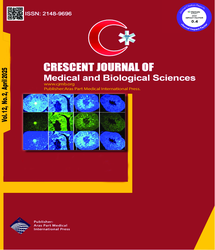| Original Article | |
| Eugenol Reduces Oxidative Stress and Modulates BAX/BCL-2 in Testes of Diabetic Rats | |
| Maryam Shayeghi Rad1, Nasim Hayati Roodbari1, Amir Afshin Khaki2, Fardin Amidi3, Akram Eidi1 | |
| 1Department of Biology, Science and Research Branch, Islamic Azad University, Tehran, Iran 2Department of Anatomical Sciences, faculty of Medicine, Tabriz University of Medical Sciences, Tabriz, Iran 3Department of Anatomy, School of Medicine, Tehran University of Medical Sciences, Tehran, Iran |
|
|
CJMB 2025; 12: 110-118 DOI: 10.34172/cjmb.2025.5022 Viewed : 2715 times Downloaded : 885 times. Keywords : Diabetes Mellitus, Eugenol, Testes, Oxidative stress, Apoptosis |
|
| Full Text(PDF) | Related Articles | |
| Abstract | |
Objectives: Diabetes is a prevalent and chronic condition that has been found to have adverse effects on male fertility. Recent studies have explored the potential of eugenol in preventing diabetes-related complications. This research aimed to investigate whether eugenol has any protective effects against testicular tissue damage in diabetic rats induced by streptozotocin (STZ). Materials and Methods: In this experimental study, 32 male Wistar rats aged 8 weeks and weighing between 200-250 g were randomly divided into four groups: a control group, a diabetic group, a diabetic group treated with 4 mg/kg of eugenol, and a control group receiving the same dose of eugenol. Diabetes was induced in the appropriate groups using a 50 mg/kg intraperitoneal (IP) dose of STZ. The treatment lasted for eight weeks, after which testicular tissue samples were collected. Results: Histopathological analysis showed that eugenol treatment resulted in a notable decrease in testicular damage. The eugenol-treated group exhibited an elevation in the activity of superoxide dismutase (SOD) and glutathione peroxidase (GPx) within the testicular tissue. The level of malondialdehyde (MDA) was significantly reduced in the eugenol-treated group. In terms of apoptosis, eugenol treatment led to decreased protein and mRNA expression of the pro-apoptotic protein BAX, a reduced BAX/BCL2 ratio, and decreased germ cell apoptosis (P < 0.01). Conversely, eugenol treatment increased the expression of the anti-apoptotic protein BCL2 at both the gene and protein levels. Conclusions: The administration of eugenol has the potential to mitigate testicular tissue damage in diabetic rats due to its antioxidant and anti-apoptotic properties. |
Cite By, Google Scholar
Google Scholar
PubMed
Online Submission System
 CJMB ENDNOTE ® Style
CJMB ENDNOTE ® Style
 Tutorials
Tutorials
 Publication Charge
Medical and Biological Research Center
About Journal
Publication Charge
Medical and Biological Research Center
About Journal
Aras Part Medical International Press Editor-in-Chief
Arash Khaki
Deputy Editor
Zafer Akan


















